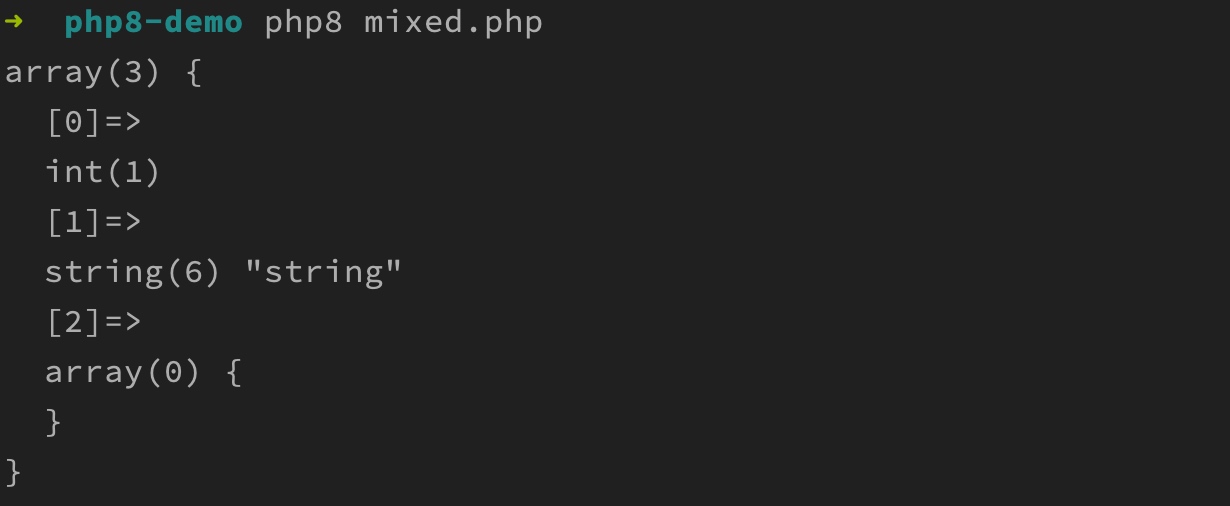PHP 8 所有新特性一览和代码示例
PHP 8.0 版本已于 11 月 26 日正式发布,学院君将在这篇文章中给大家展示 PHP 8 的所有新特性和相应的代码示例。
安装 PHP 8.0
开始之前,需要先在本地安装/升级 PHP 8.0。
通过 Homebrew 安装
在 Mac 系统上,可以通过 Homebrew 安装 PHP 最新版,目前已支持 8.0 版本:
brew install php
如果之前已经安装过更低版本的 PHP,可以通过如下命令升级:
brew upgrade php


如果你的系统提示不支持 8.0,可以先运行 brew update 更新下 Homebrew 软件源。
通过编译源码安装
你还可以通过编译源代码的方式安装 PHP 8.0 版本:
// 0、下载解压源码
wget https://www.php.net/distributions/php-8.0.0.tar.gz
tar zxvf php-8.0.0.tar.gz
cd php-8.0.0
// 1、生成 configure 文件
./buildconf --force
// 2、配置构建流程(最小化安装)
./configure --prefix=/usr/local/php80 \
--with-config-file-path=/usr/local/php80 \
--enable-cli \
--without-iconv
// 3、构建 && 安装
make && sudo make install
// 4、拷贝配置文件
sudo cp php.ini-development /usr/local/php80/php.ini
安装完成后,通过验证版本确保 PHP 8.0 已安装成功:

学院君本地操作系统是 Mac,Windows 环境安装请参考之前介绍 JIT 的这篇教程:基于 WSL 虚拟机编译安装 PHP 8。
为了方便调用 PHP 8 CLI 解释器,我在 ZSH 配置文件 ~/.zshrc 中为其配置了别名:
alias php8="/usr/local/php80/bin/php"
然后运行 source ~/.zshrc 让上述别名生效,以后就可以直接通过 php8 调用 PHP 8 CLI 解释器了:

新建示例项目
接下来,我们在 PhpStorm 中新建一个 php8-demo 项目来存放本篇教程示例代码,并且将 PHP 语言级别和命令行解释器都调整为 PHP 8.0,以便让 PhpStorm 支持最新版本 PHP(不知道怎么配置的?可以到玩转 PhpStorm 系列教程里面去翻一翻哈):

然后就可以开始我们的 PHP 8 新特性探索之旅了。
新增对联合类型的支持
联合类型允许一个变量拥有多个类型的值,而不是一个(参考 C 语言的联合类型很好理解)。
我们编写一段示例代码如下:
<?php
declare(strict_types=1);
/**
* 定义一个支持联合类型的 Number 类
*/
class Number {
private int|float $number;
public function setNumber(int|float $number): void {
$this->number = $number;
}
public function getNumber(): int|float {
return $this->number;
}
}
/**
* 我们可以传递浮点型和整型值到 Number 对象
*/
$number = new Number();
$number->setNumber(5);
var_dump($number->getNumber());
$number->setNumber(11.54);
var_dump($number->getNumber());
exit;
上述代码运行结果如下:

新增 WeakMap 特性
WeakMap 允许你创建对象到任意值的映射(类似 SplObjectStorage),同时也不会阻止作为键的对象被垃圾回收。如果某个对象键被垃圾回收,对应键值对将从集合中移除。
这一新特性非常有用,因为这样一来,开发者就不必担心代码存在内存泄露了。大多数 PHP 开发者可能对此并不关心,但是当你编写长时间运行的进程时一定要提防这个问题,比如使用 ReactPHP 进行事件驱动编程时:有了 WeakMap 后,引用的对象会在失效时自动被垃圾回收。
如果你在数组中做同样的事情,则仍然会持有该对象的引用,从而导致内存泄露。
我们编写一段示例代码如下:
<?php
declare(strict_types=1);
class FooBar {
public WeakMap $cache;
public function __construct() {
$this->cache = new WeakMap();
}
public function getSomethingWithCaching(object $obj) {
return $this->cache[$obj] ??= $this->computeSomethingExpensive($obj);
}
public function computeSomethingExpensive(object $obj) {
var_dump("I got called");
return rand(1, 100);
}
}
$cacheObject = new stdClass;
$obj = new FooBar;
// "I got called" 只会打印一次
$obj->getSomethingWithCaching($cacheObject);
$obj->getSomethingWithCaching($cacheObject);
var_dump(count($obj->cache));
// 删除该对象后 WeakMap 会释放相应内存
unset($cacheObject);
var_dump(count($obj->cache));
exit;
对应的运行结果如下:

新增 ValueError 异常
PHP 8 引入了新的名为 ValueError 的内置异常类,它继承自 Exception 基类。每次当你传递值到函数时,如果是一个无效类型,则会抛出该异常,在 PHP 8 之前,这样的操作会导致警告。
下面是示例代码:
<?php
declare(strict_types=1);
/**
* 传递数组到 array_rand,类型正确,但是 array_rand 期望传入的是非空数组
* 所以会抛出 ValueError 异常
*/
array_rand([], 0);
/**
* json_decode 的深度参数必须是有效的正整型值,
* 所以这里也会抛出 ValueError 异常
*/
json_decode('{}', true, -1);
运行结果如下:

重写方法时允许可变参数
当我们在子类重写父类方法时,任何数量的参数现在都可以被替换成可变参数,只要对应参数类型是兼容的即可:
<?php
declare(strict_types=1);
class A {
public function method(int $many, string $parameters, $here) {
}
}
class B extends A {
public function method(...$everything) {
var_dump($everything);
}
}
$b = new B();
$b->method('i can be overwritten!');
exit;
运行结果如下:

静态返回类型
PHP 8 中可以使用 static 关键字标识某个方法返回该方法当前所属的类,即使它是继承的(后期静态绑定):
<?php
declare(strict_types=1);
class Test {
public function doWhatever(): static {
// Do whatever.
return $this;
}
}
exit;
对象的类名字面量
PHP 8 中可以使用 $object::class 获取对象的类名,其返回结果和 get_class($object) 一样:
<?php
declare(strict_types=1);
class Test {
}
$test = new Test();
var_dump($test::class);
var_dump(get_class($test));
exit;
运行结果如下:

变量语法调整
new 和 instanceof 关键字现在可以被用于任意表达式:
<?php
declare(strict_types=1);
class Foo {}
class Bar {}
$names = ['Foo', 'Bar'];
$class = new ($names[array_rand($names)]);
var_dump($class);
exit;
运行结果如下:

Stringable 接口
PHP 8 引入了新的 Stringable 接口,只要某个类实现了 __toString 方法,即被视作自动实现了 Stringable 接口(咋和 Go 接口实现有点像),而不必显式声明实现该接口:
<?php
declare(strict_types=1);
class Foo {
public function __toString() {
return 'I am a class';
}
}
$obj = new Foo;
var_dump($obj instanceof Stringable);
exit;
运行结果如下:

Trait 现在可以定义抽象私有方法
<?php
declare(strict_types=1);
trait MyTrait {
abstract private function neededByTheTrait(): string;
public function doSomething() {
return strlen($this->neededByTheTrait());
}
}
class TraitUser {
use MyTrait;
// 支持该语法
private function neededByTheTrait(): string { }
// 不支持该语法 (错误的返回类型)
// private function neededByTheTrait(): stdClass { }
// 支持该语法 (非静态方法变成了静态方法)
// private static function neededByTheTrait(): string { }
}
exit;
throw 现在可以被用作表达式
throw 语句现在可以用在只允许表达式出现的地方,例如箭头函数、合并运算符和三元运算符等:
<?php
declare(strict_types=1);
$callable = fn() => throw new Exception();
$nullableValue = null;
// $value 是非空的
$value = $nullableValue ?? throw new \InvalidArgumentException();
exit;
参数列表中允许出现可选的尾部逗号
和数组中的尾部逗号类似,现在也可以在参数列表中定义一个尾部逗号:
<?php
declare(strict_types=1);
function method_with_many_arguments(
$a,
$b,
$c,
$d,
) {
var_dump("this is valid syntax");
}
method_with_many_arguments(
1,
2,
3,
4,
);
exit;
上述代码运行结果是正常的:

捕获异常而不存储到变量
现在可以编写 catch (Exception) 代码来捕获异常而不必将其存储到一个变量中:
<?php
declare(strict_types=1);
$nullableValue = null;
try {
$value = $nullableValue ?? throw new \InvalidArgumentException();
} catch (\InvalidArgumentException) {
var_dump("Something went wrong");
}
exit;
上述代码运行结果如下:

新增对 mixed 类型的支持
PHP 8 引入了新的名为 mixed 的类型,该类型等价于 array|bool|callable|int|float|null|object|resource|string:
<?php
declare(strict_types=1);
function debug_function(mixed ...$data)
{
var_dump($data);
}
debug_function(1, 'string', []);
exit;
上述代码运行结果如下:

新增对注解的支持
PHP 8 的注解实际上包含了多个 RFC:
- https://wiki.php.net/rfc/attributes_v2
- https://wiki.php.net/rfc/attribute_amendments
- https://wiki.php.net/rfc/shorter_attribute_syntax
- https://wiki.php.net/rfc/shorter_attribute_syntax_change
注解绝对是 PHP 8 引入的最大新特性之一,一开始理解起来可能有点困难(不过有 Java 基础的话会很简单)。简而言之,注解允许你添加元数据到 PHP 函数、参数、类等,这些元数据随后可以通过可编程方式获取,在 PHP 7 或者更低版本中实现类似功能需要解析代码注释块,而通过注解可以直接访问深度集成到 PHP 自身的这些信息。
我们来编写一段示例代码方便你理解,假设你想要允许开发者添加中间件到控制器类/方法,使用注解可以这么做:
<?php
declare(strict_types=1);
// 首先,我们需要定义注解,注解本身只是一个原生的 PHP 类,并且自身被打上了注解的注释
#[Attribute]
class ApplyMiddleware
{
public array $middlware = [];
public function __construct(...$middleware)
{
$this->middleware = $middleware;
}
}
// 下面的语法会添加上述注解到 MyController 类,并且传入 auth 作为参数
#[ApplyMiddleware('auth')]
class MyController
{
public function index()
{
}
}
// 然后我们就可以在类中使用反射获取所有的 ApplyMiddleware 注解并读取给定的中间件参数
$reflectionClass = new ReflectionClass(MyController::class);
$attributes = $reflectionClass->getAttributes(ApplyMiddleware::class);
foreach ($attributes as $attribute) {
$middlewareAttribute = $attribute->newInstance();
var_dump($middlewareAttribute->middleware);
}
exit;
运行上述代码,打印结果如下:

新增构造函数属性提示支持
这个新特性只是一个语法简写而言,可以将属性声明和构造函数属性初始化合并到一起:
<?php
declare(strict_types=1);
class User {
public function __construct(
public int $id,
public string $name,
) {}
}
$user = new User(1, 'Marcel');
var_dump($user->id);
var_dump($user->name);
exit;
上述代码运行结果如下:

新增 match 表达式支持
match 表达式和 switch 分支语句类型,但是语义上更加安全并且可以直接返回值:
<?php
declare(strict_types=1);
echo match (1) {
0 => 'Foo',
1 => 'Bar',
2 => 'Baz',
};
exit;
上述代码运行结果如下:

新增对空安全运算符 ?-> 的支持
当该运算符的左侧评估为 null 时,整个代码链路的执行将会被终止并整体评估为 null。如果不为 null 的话,则和普通的 -> 运算符功能一致:
<?php
declare(strict_types=1);
class User {
public function getAddress() {}
}
$user = new User();
$country = $user?->getAddress()?->country?->iso_code;
var_dump($country);
exit;
上述代码运行结果如下:

新增对命名参数的支持
命名参数允许基于参数名称传递参数到函数,而不是参数所在的位置,这样一来,函数参数就可以自解释并且与顺序无关,并且允许跳过默认值:
<?php
declare(strict_types=1);
array_fill(start_index: 0, num: 100, value: 50);
exit;
注:PHP 8 还有另一个重要的新特性 —— 引入对 JIT 的支持,不过对于上层业务代码而言是无感的,只是底层优化而已,想要了解 JIT 对 PHP 应用性能的影响,请参考学院君之前发布的这篇文章:https://laravel.geekai.co/post/21702。本篇教程所有示例代码整理自 PHP 8 - try out all new features,原文基于 Laravel 框架进行测试,这里学院君将其转化为了通用的 PHP 代码。

4 Comments
@学院君 书写错误:对象的类名字「面」量应该是「变」量
没有错 是你的词汇量不够。。。
@newbrash 这就稍微有点尴尬了。。。哈哈